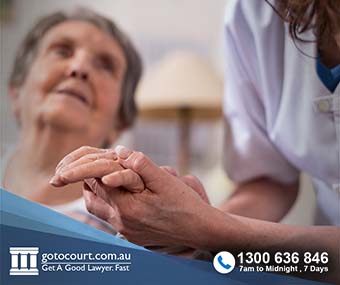Call our lawyers
now
or,
have our lawyers
call you
Duty of Care in Aged Care (Tas)
Updated on Nov 15, 2022 • 5 min read • 261 views • Copy Link
Duty of Care in Aged Care (Tas)
The Tasmanian aged care sector serves some of the most vulnerable people in the community. Those who work in the aged care industry have a legal responsibility to protect those with diminished physical and mental capacity. Aged care facilities and workers have a duty of care to consider and act in the best interests of elderly residents. In Tasmania, the duty of care in aged care is to provide the expected standard of supervision, with consideration for an elderly person’s dignity of risk. This page provides further information about the duty of care in aged care in Tasmania.
Duty of Care in Aged Care Tasmania
Certain people (particularly professionals) have a duty to take precautions against causing harm to another person. In Tasmania, this common law responsibility is largely codified in the Civil Liabilities Act 2002.
An aged care facility must, at a minimum, employ competent staff and offer quality clinical treatment and sanitary and safe conditions. How duty of care is implemented depends on the capacity and needs of each elderly resident. For instance, a resident with diminished mental capacity needs greater supervision and guidance than a resident who is largely self-sufficient. As such, a worker in the aged care industry should tailor their approach to each resident’s individual needs.
It must be noted, however, that the legal standard of care required of an aged care worker or facility is not faultless. The duty of care standard is what a comparable worker or provider would reasonably do in the circumstances. The following are some everyday examples of duty of care responsibilities in the aged care sector in Tasmania:
- Ensuring that a resident is not too cold or too hot;
- Providing nutritious meals and assistance with feeding if required;
- Ensuring that residents are hydrated;
- Providing assistance when a resident has trouble walking;
- Helping a resident to shower or use bathroom facilities; and
- Encouraging residents to take their medication on time.
Perhaps a worker’s most important responsibility under their duty of care is an obligation to inform their supervisor and/or the resident’s family of any foreseeable dangers that the resident faces.
Breach of Duty of Care in Aged Care in Tasmania
Sometimes an aged care worker or facility fails in their duty of care, and a resident is harmed as a result. When a provider or carer is guilty of negligence, the resident or a family member should immediately file a complaint with My Aged Care. Additionally, the negligent party may be subject to a civil liability claim under the Civil Liability Act and even, if the conduct was deliberate, face criminal prosecution.
The most serious breach of duty of care is abuse. It is also very serious for a worker to fail to report abuse. Carers and facilities are required to report any physical or sexual abuse of a resident to the police within 24 hours. It is also compulsory to report incidents of abuse in residential aged care to the Aged Care Quality & Safety Commission.
Aged Care Rights
The Tasmanian government has introduced multiple safeguards to protect the rights of the elderly in the community. The Tasmanian Council of the Aging (COTA) developed Guiding Principles to protect and respect the rights of older residents. These Principles are adapted from the United Nations Principles for Older Persons and the South Australian Charter of the Rights and Freedom of Older People.
In Tasmania, government-subsidised aged care facilities are obliged to follow the Charter of Aged Care Rights. The facility must give all residents a copy of this Charter so that they are aware of their rights. Under these regulations, residents are entitled to independence, autonomy, privacy, access to information about themselves, quality and courteous care, freedom from neglect and abuse, and the opportunity to complain and exercise their rights without retaliation.
In addition, all government-funded aged care facilities must abide by the Aged Care Quality Standards. These standards reflect the services and level of care that the community expects from aged care providers. The Aged Care Quality and Safety Commission monitors and assesses these facilities to ensure compliance.
Dignity of Risk
In Tasmania, the elderly are entitled to dignity of risk. This concept explains that older people retain their right to make decisions even if it carries some risk. People who work in the aged care sector must provide a standard of care while encouraging residents to have as much autonomy as possible. While it is essential to protect vulnerable residents from harm, they should not be treated as prisoners, and their wishes should be respected. For example, if a resident with diminished mental capacity wants to venture out of a facility to shop, the best approach is to consider how to mitigate risk. This might involve asking a family member to accompany them or even sending a worker with the resident in case they become disorientated during their outing.
Go To Court Lawyers can answer any questions or concerns that you have about the duty of care in aged care in Tasmania. Please contact our civil law team on 1300 636 846 for any legal advice.

Affordable Lawyers
Our Go To Court Lawyers will assist you in all areas of law. We specialise in providing legal advice urgently – at the time when you need it most. If you need a lawyer right now, today, we can help you – no matter where you are in Australia.How It Works







1. You speak directly to a lawyer
When you call the Go To Court Legal Hotline, you will be connected directly to a lawyer, every time.


2. Get your legal situation assessed
We determine the best way forward in your legal matter, free of charge. If you want to go ahead and book a face-to-face appointment, we will connect you with a specialist in your local area.


3. We arrange everything as needed
If you want to go ahead and book a fact-to-face appointment, we will connect you with a specialist in your local area no matter where you are and even at very short notice.


















